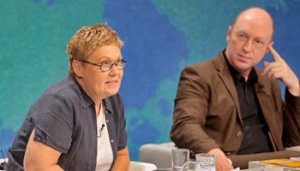 Katharina Born (Bild: ORF/Johannes Puch)
Katharina Born (Bild: ORF/Johannes Puch)
Praise and criticism for Katharina Born
The final afternoon of readings in Klagenfurt continued with Katharina Born’s “Fifty-Fifty”. The text spins together a network of relationships from 1968 to the present and talks about life’s “missed opportunities”. Mother and daughter, both in a love-hate relationship with the same man: the opportunities of love are “fifty-fifty”.
Katharina Born
Videoporträt
Lesung
Diskussion
Much clumsiness and wrong timing
Alain Claude Sulzer began: “This is a story about paternal love and leaving the parental home; there are, however, a number of oddities, which – given the text’s claim to realism – left a bad taste in my mouth.” For a 19-year-old to translate the text of a famous author, that’s entirely unrealistic, he believes: “That just never happens.”
 Alain Claude Sulzer (Bild: ORF/Johannes Puch)
Alain Claude Sulzer (Bild: ORF/Johannes Puch)
The situation of a “narrow-minded middle-class man of the ’68 generation” is told using the same narrow-minded language. “Conventional, without ambiguity – I can’t find the portrayed violence in the language”, is Sulzer’s judgement. “Too much clumsiness and wrong timing.”
“Atmosphere too clean and neat”
“I liked the run-over dog”, said Paul Jandl – but that was the only thing the juror praised about the text. Although the story is a story of the ’68 era, it could equally have been set in the 1930s or ’40s, Jandl believes, and, referring to the end of the story, he said: “I can’t even imagine how anyone can become pregnant in such a clean and neat atmosphere.”
 Paul Jandl (Bild: ORF/Johannes Puch)
Paul Jandl (Bild: ORF/Johannes Puch)
An “excellent text” according to Feßmann
Meike Feßmann objected: the text does have an “erotic undertone”. The juror praised the linguistically well crafted details and the “moving narrative focus”. What’s tragic is that the daughter befalls the same fate as the mother: “humiliation by the hands of a former lover”. “Outstanding!”
Spinnen saw the text as film treatment
“This is something for interior fittings”, was Burkhard Spinnen’s polemical comment. For him, the text is reminiscent of the “treatment” for a film, a draft: the text is dramatically short, pooling together many problems. “30, 40 years must fit onto eleven pages.” The characters are fitted, he believes, with the historical background. The question is, according to Spinnen: “Does this work as literature, or is it a trick that is used to talk about clichés with a screen as background?”
 Karin Fleischanderl (Bild: ORF/Johannes Puch)
Karin Fleischanderl (Bild: ORF/Johannes Puch)
“What’s missing is what’s specific for the ’68 era”
“The text stays on the surface too much”, was also Karin Fleischanderl’s criticism. She would have liked the author to present the structure of these “sloppy conditions”. “For me, what’s specific about the ’68 era was missing.”
Mangold: “Field of tension can always be felt”
Ijoma Mangold defended the text: “It is not a trick when the characters are provided with a contemporary-historical context.” He emphasised that “incredible structures of violence” pervade the story, where the field of tension the characters are in can always be “felt”.
 Katharina Born (Bild: ORF/Johannes Puch)
Katharina Born (Bild: ORF/Johannes Puch)
Barbara Johanna Frank
translated by expectTranslations